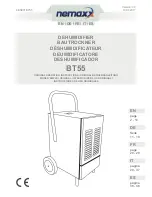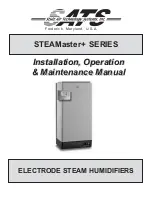
Drainage.
The water can be drained:
Via the tank (2)
.
The water condensation is collected in the tank and when it is full,
the internal float puts the appliance on standby, the gauge on the panel lights up
and a signal will sound.
Remove the tank without spilling any water, empty it and
dry it. Check that the float is free to move and replace it correctly. The transparent
slot on the front of the tank shows the water level.
Continuous
The continuous drainage spout (6), on the back of the appliance has a rubber cap (7):
remove the cap and attach the rubber tube with 9mm internal diameter and 1m max.
length (comes supplied with some models). Make sure the connection is leak-proof.
Check that the drain is at a lower height than the spout and that the whole tube is
sloping evenly and that it is lower than the spout.
Do not remove the water tank from its place.
If continuous drainage is not in use, remove the drainage tube and close the spout
with the rubber cap.
Filter
The air inlet grille has a filter (5) which traps dust: it is placed internally and to access
it, it is necessary to remove the tank. It is accessible from the bottom - slide
downwards gripping the central clasp with two fingers. See the paragraph below for
filter maintenance. Replace so that the two clips are down and facing frontwards.
Follow the indications (arrows and “FRONT”) printed on the edge.
Handle
There is a foldable handle on the top (3), for transportation.
Cord Winder
There are fixtures on the back (8) to wind the mains cable around.
USE
Before each use, make sure that:
-the appliance is in good condition
-that the mains cable is not damaged
-that the tank is empty, and fully in place.
-that the water drainage spout is properly closed with the cap whenever the tank is
used, or the drainage tube is inserted properly and in place whenever continuous
drainage is used.
2.
Connect the plug to the power socket.
















































